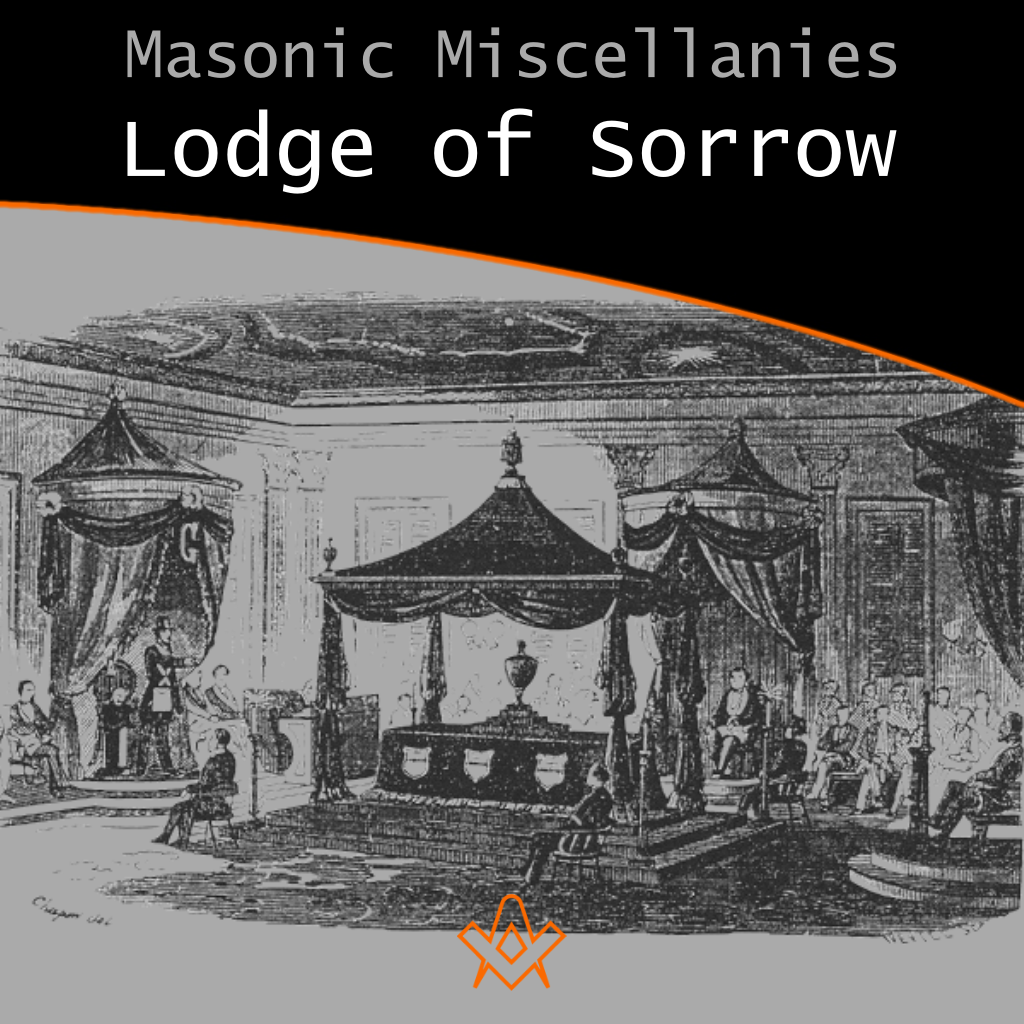RITUAL FOR A LODGE OF SORROW
BY JOHN W. SIMONS
PAST GRAND MASTER OF NEW YORK 15*
Extracted from pages 345-374 of General Ahiman Rezon, by Daniel E Sickles, [1868]
PREFACE
In the performance of the ceremonies of a Lodge of Sorrow, it should be understood that the ritual, although necessarily of a funereal character, differs essentially from the office for the burial of the dead.
In the latter case, we are in the actual presence of the deceased, and engaged in the last rites of affection and respect for one who has been our companion in life, and whose mortal remains we are about to consign to the last resting-place, amid the tears of surviving friends, and under the peculiar influences which attach to the rites of sepulture [sic] and the final earthly farewell to one who, but a few hours previous, could respond to our questions, and exchange with us the signs of the living.
We are then called to consider the “mattock, the spade, the coffin, and the melancholy grave,” in all their gloomy reality, and to reflect that the hour must soon be tolled “when we, too, shall be clothed in the habiliments of death, and deposited in the voiceless tomb.”
The Lodge of Sorrow, on the contrary, is intended to celebrate the memory of our departed brethren; and while we thus recall to our recollection their virtues, and temper anew our resolutions so to live, that, when we shall have passed the silent portals, our memories may be cherished with grateful remembrance, we learn to look upon death from a more elevated point of view; to see in it the wise and necessary transition from the trials and imperfections of this world, to the perfect life for which our transient journey hero has been the school and the preparation.
We thus learn “that the soul is the whole of man; that for it to be born, is really to die; that earth is but its place of exile, and heaven its native land.”
In the preparation of the following ritual, it has been sought to typify the inevitable necessity of death; the gloom and sorrow that attend the “last of earth,” and surround “the narrow house appointed for all living,” and the consoling fact of the immortality of the soul and the resurrection to a new and true life, where sorrow and tears have no place.
Guided by these views in the accomplishment of our task, and aided by the use of rituals from Germany, France, and England, it is believed that the work now submitted will supply a want long felt by the brethren in the United States, and enable them to conduct the solemn exercises of such occasions with dignity and propriety.
Vocal and instrumental music are indispensable to the proper effect of the ceremony.
Brethren should wear dark clothing, and no insignia but the white lambskin apron and white gloves.
Finally, we desire to add, that there is no good reason for any attempt at secrecy in the ceremonies of Sorrow Lodges; but that, on the other hand, they may be held in churches or public halls, or in the presence of friends at the lodge-room, with benefit to all concerned.
This, however, will necessarily be subject to the wishes of the brethren themselves.
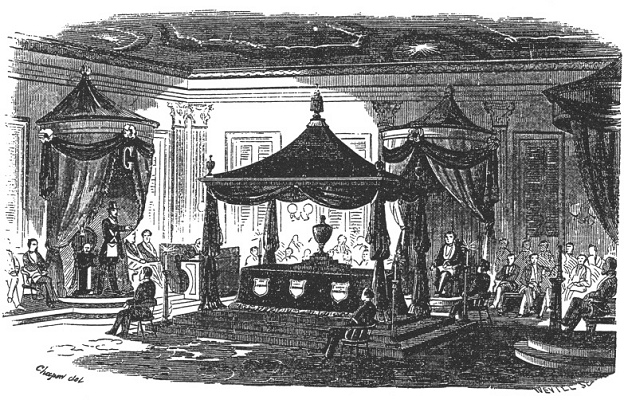
LODGE OF SORROW
IMAGE LINKED: wikimedia Attribution 4.0 International (CC BY 4.0)
LODGE OF SORROW
PREPARATION OF THE HALL
I. THE Lodge-room should be appropriately draped in black, and the several stations covered with the same emblem of mourning.
II. On the Master’s pedestal is a skull and lighted taper.
III. In the center of the room is placed the catafalque, which consists of a rectangular platform, about six feet long by four wide, on which are two smaller platforms, so that three steps are represented. On the third one should be an elevation of convenient Night, on which is placed an urn. The platform should be draped in black, and a canopy of black drapery may he raised over the urn.
IV. At each corner of the platform will be placed a candlestick, bearing a lighted taper, and near it, facing the East, will be seated a brother, provided with an extinguisher, to be used at the proper time.
V. During the first part of the ceremonies the lights in the room should burn dimly.
VI. Arrangements should be made to enable the light to be increased to brilliancy at the appropriate point in the ceremony.
VII. On the catafalque will be laid a pair of white gloves, a lambskin apron, and, if the deceased brother had been an officer, the appropriate insignia of his office.
VIII. Where the Lodge is held in memory of several brethren, shields bearing their names are placed around the catafalque.
OPENING THE LODGE
The several officers being in their places, and the brethren seated, the Master will call up the Lodge, and say,
Master. Brother Senior Warden: For what purpose are we assembled?
Senior Warden. To honor the memory of those brethren whom death hath taken from us; to contemplate our own approaching dissolution; and, by the remembrance of immortality, to raise our souls above the considerations of this transitory existence.
Master. Brother Junior Warden: What sentiments should inspire the souls of Masons on occasions like the present?
Junior Warden. Calm sorrow for the absence of our brethren who have gone before us; earnest solicitude for our own eternal welfare, and a firm faith and reliance upon the wisdom and goodness of the Great Architect of the Universe.
Master. Brethren: Commending these sentiments to your earnest consideration, and invoking your assistance in the solemn ceremonies about to take place, I declare this Lodge of Sorrow opened.
The Chaplain or Master will then offer the following or some other suitable PRAYER:
GRAND ARCHITECT OF THE UNIVERSE, in whose holy sight centuries are but as days, to whose omniscience the past and the future are but as one eternal present; look down upon thy children, who still wander among the delusions of time
—who still tremble with dread of dissolution, and shudder at the mysteries of the future; look down, we beseech thee, from thy glorious and eternal day into the dark night of our error and presumption, and suffer a ray of thy divine light to penetrate into our hearts, that in them may awaken and bloom the certainty of life, reliance upon thy promises, and assurance of a place at thy right hand.
—AMEN.
Response. So mote it be.
The following or some other appropriate ODE may here be sung:
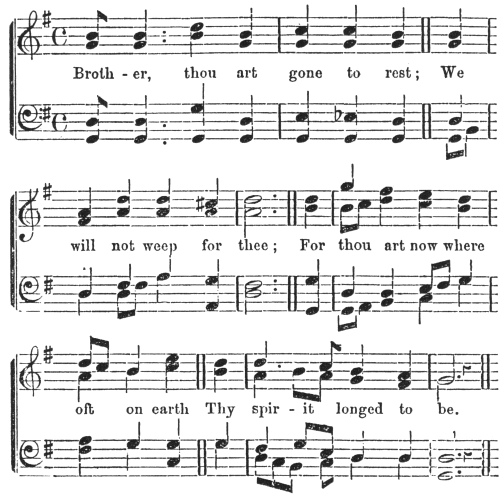
Music by DE. LOWELL MASON,
arranged for four voices, by T. S. NEDHAM.
Brother, thou art gone to rest;
We will not weep for thee;
For thou art now where oft on earth
Thy spirit longed to be.
Brother, thou art gone to rest;
Thy toils and cares are o’er;
And sorrow, pain, and suffering, now,
Shall ne’er distress thee more.
Brother, thou art gone to rest;
And this shall be our prayer,
That, when we reach our journey’s end,
Thy glory we shall share.
The Master (taking the skull in his hand) will then say:
BRETHREN: In the midst of life we are in death, and the wisest cannot know what a day may bring forth. We live but to see those we love passing away into the silent land.
Behold this emblem of mortality, once the abode of a spirit like our own: beneath this mouldering canopy once shone the bright and busy eye: within this hollow cavern once played the ready, swift, and tuneful tongue; and now, sightless and mute, it is eloquent only in the lessons it teaches us.
Think of those brethren who, but a few days since, were among us in all the pride and power of life; bring to your minds the remembrance of their wisdom, their strength, and their beauty; and then reflect that “to this complexion have they come at last;” think of yourselves, thus will you be when the lamp of your brief existence has burned out.
Think how soon death, for you, will be a reality. Man’s life is like a flower, which blooms to-day, and to-morrow is faded, cast aside, and trodden under foot.
The most of us, my brethren, are fast approaching, or have already passed the meridian of life; our sun is setting in the West; sand, oh! how much more swift is the passage of our declining years than when we started upon the journey, and believed—as the young are too apt to believe—that the roseate hues of the rising sun of our existence were always to be continued.
When we look back upon the happy days of our childhood, when the dawning intellect first began to exercise its powers of thought, it seems as but yesterday, and that, by a simple effort of the will, we could put aside our manhood, and seek again the loving caresses of a mother, or be happy in the possession of a bauble; and could we now realize the idea that our last hour had come, our whole earthly life would seem but as the space of time from yesterday until to-day.
Centuries upon centuries have rolled away behind us; before us stretches out an eternity of years to come; and on the narrow boundary between the past and the present flickers the puny taper we term our life.
When we came into the world, we knew naught of what had been before us; but, as we grew up to manhood, we learned of the past; we saw the flowers bloom as they had bloomed for centuries; we beheld the orbs of day and night pursuing their endless course among the stars, as they had pursued it from the birth of light; we learned what men had thought, and said, and done, from the beginning of the world to our day; but only through the eye of faith can we behold what is to come hereafter, and only through a firm reliance upon the Divine promises can we satisfy the yearnings of an immortal soul.
The cradle speaks to us of remembrance—the coffin of hope, of a blessed trust in a never-ending existence beyond the gloomy portals of the tomb.
Let these reflections convince us how vain are all the wranglings and bitterness engendered by the collisions of the world; how little in dignity above the puny wranglings of ants over a morsel of food or for the possession of a square inch of soil.
What shall survive us? Not, let us hope, the petty strifes and bickerings, the jealousies and heart-burnings, the small triumphs and mean advantages we have gained, but rather the noble thoughts, the words of truth, the works of mercy and justice, that ennoble and light up the existence of every honest man, however humble, and live for good when his body, like this remnant of mortality, is mouldering in its parent dust.
Let the proud and the vain consider how soon the gaps are filled that are made in society by those who die around them; and how soon time heals the wounds that death inflicts upon the loving heart; and from this let them learn humility, and that they are but drops in the great ocean of humanity.
And when God sends his angel to us with the scroll of death, let us look upon it as an act of mercy, to prevent many sins and many calamities of a longer life; and lay down our heads softly and go to sleep, without wrangling like froward children.
For this at least man gets by death, that his calamities are not immortal.
To bear grief honorably and temperately, and to die willingly and nobly, are the duties of a good man and true mason.
A solemn piece of music will now be performed, or the following ode may be sung:
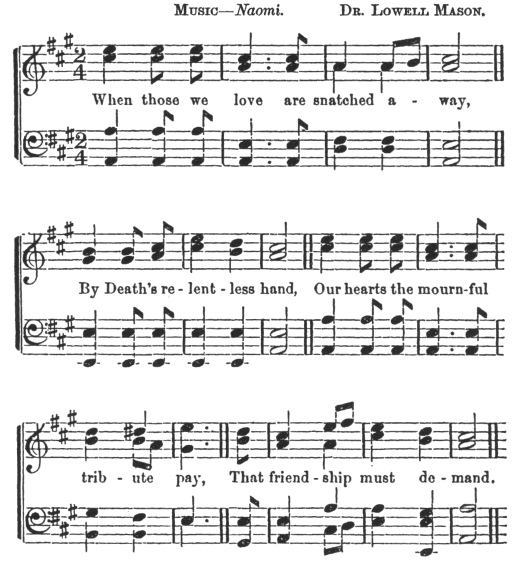
Music—Naomi.
DR. LOWELL MASON
When those we love are snatched away,
By Death’s relentless hand,
Our hearts the mournful tribute pay,
That Friendship must demand.
While pity prompts the rising sigh,
With awful power imprest;
May this dread truth, “I too must die,”
Sink deep in every breast.
Let this vain world allure no more:
Behold the opening tomb!
It bids us use the present hour;
To-morrow death may come.
The voice of this instructive scene
May every heart obey;
Nor be the faithful warning vain
Which calls to watch and pray!
At its conclusion the Chaplain will read the following passages:
Lo, He goeth by me and I see Him not. He passeth on also, but I perceive Him not. Behold He taketh away, who can hinder Him?
Man that is born of a woman is of few days, and full of trouble. He cometh forth like a flower, and is cut down; he fleeth also as a shadow, and continueth not.
Seeing his days are determined, the number of his months are with Thee, Thou hast appointed his bounds that he cannot pass; turn from him that he may rest, till he shall accomplish, as an hireling, his day.
For there is hope of a tree if it be cut down, that it will sprout again, and that the tender branch thereof will not cease.
Though the root thereof wax old in the earth, and the stock thereof die in the ground, yet through the scent of water it will bud and bring forth boughs like a plant.
But man dieth and wasteth away; yea, man giveth up the ghost, and where is he? As the waters fail from the sea and the flood decayeth and drieth up, so man lieth down, and riseth not; till the heavens be no more they shall not awake nor be raised out of their sleep.
My days are passed, my purposes are broken off, even the thoughts of my heart. If I wait, the grave is mine house, I have made my bed in the darkness.
I have said to corruption, thou art my father. And where is now thy hope? as for my hope, who shall see it? They shall go down to the bars of the pit, when our rest together is in the dust.
My bone cleaveth to my skin and to my flesh. Oh, that my words were now written; oh, that they were printed in a book! That they were graven with an iron pen and lead in the rock forever!
For I know that my Redeemer liveth, and that He shall stand at the latter day upon the earth. And though after my skin worms destroy this body, yet in my flesh shall I see God.
Whom I shall see for myself, and mine eyes shall behold, and not another.
For Thou cast me into the deep, in the midst of the seas; and Thy floods compassed me about; all Thy billows and Thy waves passed over me Then I said, I am cast out of Thy sight; yet will I look again toward Thy holy temple.
The waters compassed me about, even to the soul, the depth closed me round about, the weeds were wrapt about my head.
I said, in the cutting off of my day I shall go to the gates of the grave; I am deprived of the residue of my years; I said, I shall not see the Lord, even the Lord in the land of the living; I shall behold man no more with the inhabitants of the world.
Behold, for peace I had great bitterness; but Thou hast in love to my soul delivered it from the pit of corruption.
For the grave cannot praise Thee, death cannot celebrate Thee; the living, the living, he shall praise Thee as I do this day.
Are not my days few? Cease, then, and let me alone, that I may take comfort a little, before I go whence I shall not return, even to the land of darkness, and the shadow of death.
A land of darkness, as darkness itself; and of the shadow of death, without any order, and where the light is as darkness.
An interval of profound silence will be observed. The general lights of the Hall, if there be convenience, will be turned low, and the four brethren will extinguish the tapers near which they are placed.
PRAYER BY THE CHAPLAIN
OUR FATHER WHO ART IN HEAVEN, it hath pleased thee to take from among us those who were our brethren.
Let time, as it heals the wounds thus inflicted upon our hearts and on the hearts of those who were near and dear to them, not erase the salutary lessons engraved there; but let those lessons always continuing distinct and legible make us and them wiser and better.
And whatever distress or trouble may hereafter come upon us, may we ever be consoled by the reflection that thy wisdom and thy love are equally infinite, And that our sorrows are not the visitations of thy wrath, but the result of the great law of harmony by which everything is being conducted to a good and perfect issue in the fullness of thy time.
Let the loss of our brethren increase our affection for those who are yet spared to us, and make us more punctual in the performance of the duties that Friendship, Love, and Honor demand.
When it comes to us also to die, may a firm and abiding trust in thy mercy dispel the gloom and dread of dissolution.
Be with us now, and sanctify the solemnities of this occasion to our hearts, that we may serve thee in spirit and understanding.
And to thy name shall be ascribed the praise forever.
—AMEN.
Response. So mote it be.
The Wardens, Deacons and Stewards, will now approach the East and form a procession, thus:
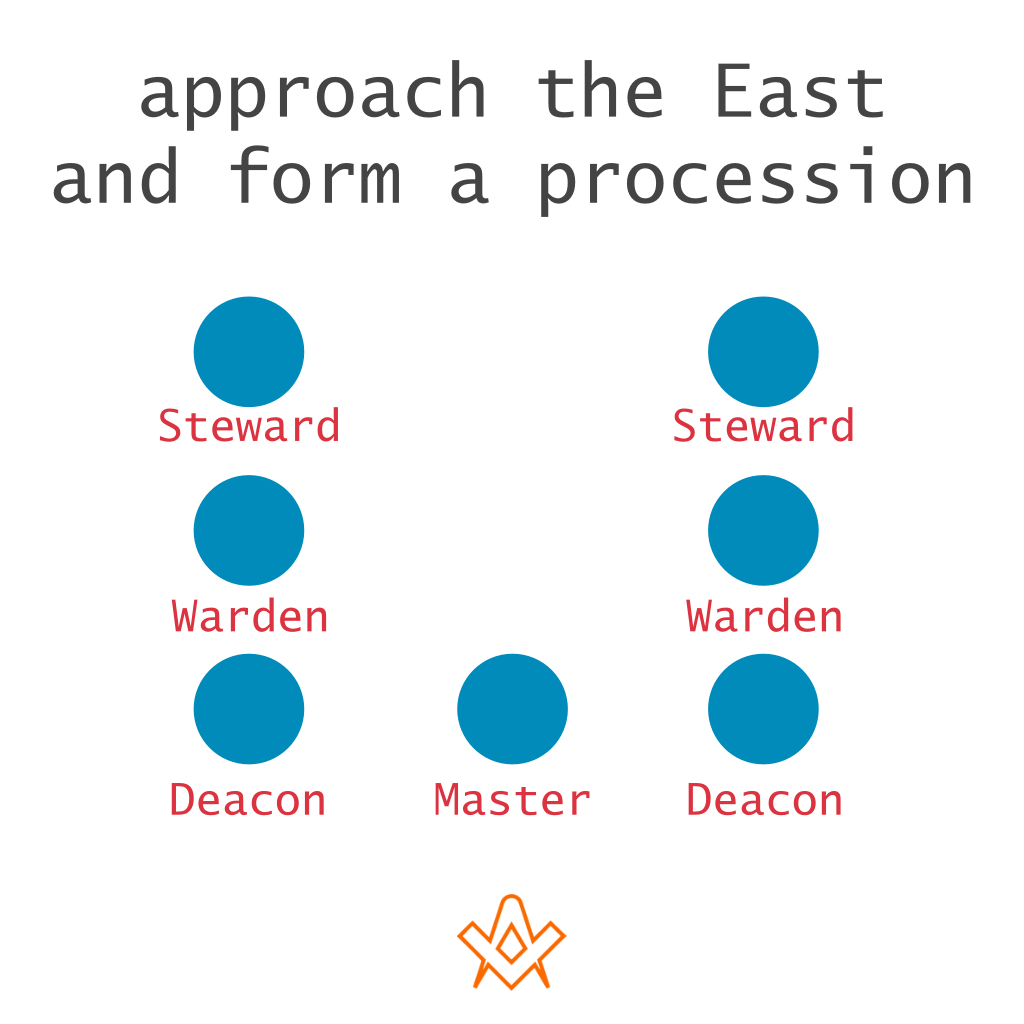
Which will move once round the catafalque to slow and solemn music.
On arriving in the East, the procession will halt and open to the right and left.
The Junior Warden will then advance to the catafalque and placing upon it a bunch of white flowers will say:
In memory of our departed brethren I deposit these white flowers, emblematical of that pure life to which they have been called, and reminding us that as these children of an hour will droop and fade away, so, too; we shall soon follow those who have gone before us, and inciting us so to fill the brief span of our existence that we may leave to our survivors a sweet savor of remembrance.
The Junior Warden will now return to his place, and ah interval of profound silence will be observed.
The procession will again be formed, and move as before, to the sound of slow music, twice around the catafalque.
They will open as before, and the Senior Warden approaching the catafalque will place upon it a wreath of white flowers and say:
As the sun sets in the West, to close the day and herald the approach of night, so, one by one we lay us down in the darkness of the tomb to wait in its calm repose for the time when the heavens shall pass away as a scroll, and man, standing in the presence of the Infinite, shall realize the true end of his pilgrimage here below. Let these flowers be to us the symbol of remembrance of all the virtues of our brethren who have preceded us to the silent land, the token of that fraternal alliance which binds us while on earth and which we hope will finally unite us in heaven.
The Senior Warden returns to his place, and an interval of silence will be observed.
The procession will again be formed, and move three times around the catafalque to slow music, as before.
Arrived in the East, the Master will advance and place upon the urn a wreath of evergreen, and say:
It is appointed unto all men once to die, and after death cometh the resurrection.
The dust shall return to the earth and the spirit unto God who gave it. In the grave all men are equal; the good deeds, the lofty thoughts, the heroic sacrifices alone survive and bear fruit in the lives of those who strive to emulate them.
While, therefore, nature will have its way, and our tears will fall upon the graves of our brethren, let us be reminded by the evergreen symbol of our faith in immortal life that the dead are but sleeping, and be comforted by the reflection that their memories will not be forgotten; that they will still be loved by those who are soon to follow them; that in our archives their names are written, and that in our hearts there is still a place for them.
And so, trusting in the infinite love and tender mercy of him without whose knowledge not even a sparrow falls, let us prepare to meet them where there is no parting and where with them we shall enjoy eternal rest.
The Master will return to his place, and a period of silence will obtain.
The Chaplain will now be conducted to the altar, where he will read:
But some man will say: How are the dead raised up? and with what body do they come? Thou fool, that which thou sowest is not quickened except it die: and that which thou sowest thou sowest not that body that shall be, but bare grain; it may chance of wheat or of some other grain: but God giveth it a body as it hath pleased him, and to every seed his own body.
All flesh is not the same flesh; but there is one kind of flesh of men, another flesh of beasts, another of fishes, and another of birds.
There are also celestial bodies, and bodies terrestrial: but the glory of the celestial is one, and the glory of the terrestrial is another.
There is one glory of the sun, and another glory of the moon, and another glory of the stars; for one star differeth from another star in glory.
So also is the resurrection of the dead. It is sown in corruption; it is raised in incorruption: it is sown in dishonor; it is raised in glory: it is sown in weakness; it is raised in power: it is sown a natural body; it is raised a spiritual body.
There is a natural body, and there is a spiritual body. And so it is written, The first man Adam was made a living soul, the last Adam was made a quickening spirit.
Howbeit, that was not first which is spiritual, but that which is natural; and afterward that which is spiritual.
The first man is of the earth, earthy: the second man is the Lord from heaven. As is the earthy, such are they also that are earthy; and as is the heavenly, such are they also that are heavenly. And as we have borne the image of the earthy, we shall also bear the image of the heavenly.
Now this I say, brethren, that flesh and blood cannot inherit the kingdom of God; neither doth corruption inherit incorruption.
Behold, I shew you a mystery: we shall not all sleep, but we shall all be changed; in a moment, in the twinkling of an eye, at the last trump: for the trumpet shall sound, and the dead shall be raised incorruptible, and we shall be changed.
For this corruptible must put on incorruption, and this mortal must put on immortality. So when this corruptible shall have put on incorruption, and this mortal shall have put on immortality, then shall be brought to pass the saying that is written, Death is swallowed up in victory.
O death, where is thy sting? O grave, where is thy victory?
As the Chaplain pronounces the concluding words, “O grave where is thy victory?” the lights in the Hall will be raised to brilliancy, the four brethren seated around the catafalque will relight the tapers.
The Chaplain will return to his place in the East, and the following ode will be sung, to music of a more cheerful character:
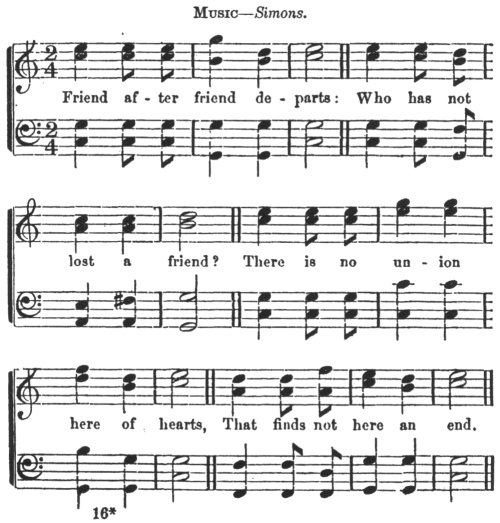
Music—Simons.
Friend after friend departs:
Who has not lost a friend?
There is no union here of hearts,
That finds not here an end.
Where this frail world our only rest,
Living or dying, none were blest.
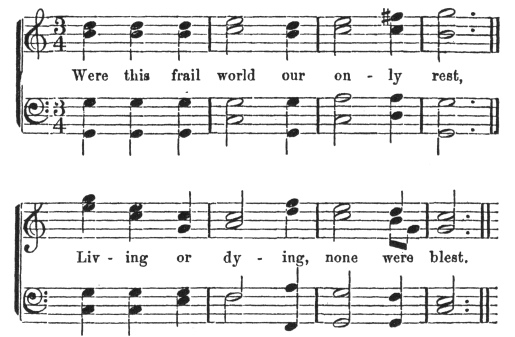
Music cont.
There is a world above
Where parting is unknown—
A whole eternity of love
And blessedness alone;
And faith beholds the dying here
Translated to that happier sphere.
The Orator will then pronounce the Eulogium.
Then follows an ode:
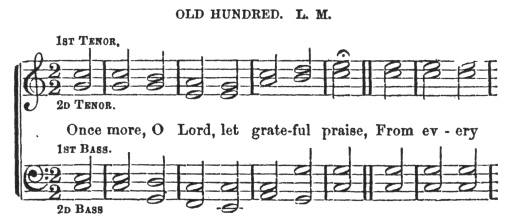
OLD HUNDRED. L. M.
Once more, O Lord, let grateful praise,
From every heart to thee ascend;
Thou art the guardian of our days,
Our first, our best and changeless friend.
Hear, now, our parting hymn of praise,
And bind our hearts in love divine;
O, may we walk in wisdom’s ways,
And ever feel that we are thine.
CLOSING
Master. Brother Senior Warden, our recollection of our departed friends has been refreshed, and we may now ask ourselves, were they just and perfect Masons, worthy men, unwearied toilers in the vineyard, and possessed of so many virtues as to overcome their faults and shortcomings?
Answer these questions, as Masons should answer.
Senior Warden. Man judgeth not of man. He whose infinite and tender mercy passeth all comprehension, whose goodness endureth forever, has called our brethren hence. Let him judge.
In ancient Egypt no one could gain admittance to the sacred asylum of the tomb until he had passed under the most solemn judgment before a grave tribunal.
Princes and peasants came there to be judged, escorted only by their virtues and their vices.
A public accuser recounted the history of their lives, and threw the penetrating light of truth on all their actions.
If it were adjudged that the dead man had led an evil life, his memory was condemned in the presence of the nation, and his body was denied the honors of sepulture [sic].
But Masonry has no such tribunal to sit in judgment upon her dead; with her, the good that her sons have done lives after them, and the evil is interred with their bones.
She does require, however, that whatever is said concerning them shall be the truth; and should it ever happen that of a Mason, who dies, nothing good can be truthfully said she will mournfully and pityingly bury him out of her sight in silence.
Master. Brethren, let us profit by the admonitions of this solemn occasion, lay to heart the truths to which we have listened, and resolve so to walk that when we lay us down to the last sleep it may be the privilege of the brethren to strew white flowers upon our graves and keep our memories as a pleasant remembrance.
Brother Senior Warden, announce to the brethren that our labors are now concluded, and that it is my pleasure that this Lodge of Sorrow be closed.
Senior Warden. Brother Junior Warden, the labors of this Lodge of Sorrow being ended, it is the pleasure of the Master that it be now closed.
Make due announcement to the brethren, and invite them to assist.
Junior Warden. (Calling up the Lodge.) Brethren, the labors of this Lodge of Sorrow being ended, it is the pleasure of the Master that it be now closed.
Master. Let us unite with our Chaplain in an invocation to the Throne of Grace.
* * * * * * *
Master. This Lodge of Sorrow is now closed.

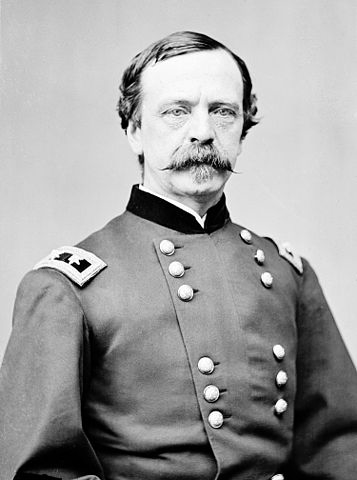
Daniel Edgar Sickles (October 20, 1819 – May 3, 1914) was an American politician, soldier, and diplomat.
Born to a wealthy family in New York City, Sickles was involved in a number of scandals, most notably the 1859 homicide of his wife’s lover, U.S. Attorney Philip Barton Key II, whom Sickles gunned down in broad daylight in Lafayette Square, across the street from the White House.
He was acquitted after using temporary insanity as a legal defence for the first time in United States history.
Upon the outbreak of the American Civil War in 1861, Sickles became one of the war’s most prominent political generals, recruiting the New York regiments that became known as the Excelsior Brigade in the Army of the Potomac.
Despite his lack of military experience, he served as a brigade, division, and corps commander in some of the early Eastern campaigns.
His military career ended at the Battle of Gettysburg in July 1863, after he moved his III Corps without orders to an untenable position, where they were decimated and slowed General James Longstreet’s flanking manoeuvre.
Sickles himself was wounded by cannon fire at Gettysburg and had to have his leg amputated.
He was eventually awarded the Medal of Honour for his actions.

The General Ahiman Rezon and Freemason’s Guide
By: Daniel Edgar Sickels
This work has been selected by scholars as being culturally important, and is part of the knowledge base of civilization as we know it. This work was reproduced from the original artifact, and remains as true to the original work as possible. Therefore, you will see the original copyright references, library stamps (as most of these works have been housed in our most important libraries around the world), and other notations in the work.
This work is in the public domain in the United States of America, and possibly other nations. Within the United States, you may freely copy and distribute this work, as no entity (individual or corporate) has a copyright on the body of the work.
As a reproduction of a historical artifact, this work may contain missing or blurred pages, poor pictures, errant marks, etc. Scholars believe, and we concur, that this work is important enough to be preserved, reproduced, and made generally available to the public. We appreciate your support of the preservation process, and thank you for being an important part of keeping this knowledge alive and relevant.
Recent Articles: Masonic Miscellanies
 Masonic Miscellanies - The Amulet of the Ladder Explore the cosmic significance of the Ladder in ancient Egyptian mythology through Wallis Budge's "Egyptian Magic." Discover how this profound symbol bridges the mortal and divine, encapsulating the Egyptians' fervent afterlife aspirations with a blend of myth, magic, and material culture. Dive into the celestial ascent of Osiris and mortal souls. |
 Masonic Miscellanies - Adulterine Gilds Guilds, the associations that shaped medieval European society, were more than just organizations of artisans and merchants. They played a vital role in the economic and social development of towns and cities. This exploration delves into the intriguing concept of adulterine gilds and their interconnectedness with guilds, offering insight into the significance of legal authorization and recognition in medieval Europe. |
 Masonic Miscellanies - Masonic Orb Discover the fascinating world of Masonic ball watch fobs, intricately crafted with tiny pyramids that form a cross when opened. These decorative accessories were all the rage in the late 1800s and early 1900s, and they still hold a certain allure today. Explore the different varieties and symbols found on these unique pieces that carry deep Masonic meaning. |
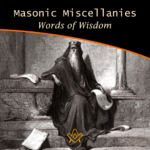 Masonic Miscellanies – Words of Wisdom Uncover timeless wisdom from King Solomon to Albert Pike in our latest Masonic Miscellanies, a treasure trove of insights for Masons. Journey through the ages and glean inspiring sayings, reflecting on their profound influence on Masonic principles. An enriching read for the enlightened. |
 Masonic Miscellanies - Symbolism of the Right Hand Unlock the enigmatic realm of Freemasonry as we delve into its age-old symbols, rituals, and philosophies. This thought-provoking exploration, drawn from Mackey's Revised Encyclopedia of Freemasonry, focuses on the iconic 'right hand' symbol - its rich history, universality, and profound significance. |
 Masonic Miscellanies - Order of the Secret Monitor Unveil the mystery of Freemasonry with 'The Order of the Secret Monitor'. Discover this lesser-known appendant order, its unique rituals, and the profound teachings it offers. Explore the bonds of friendship and brotherhood it fosters, all wrapped in an intriguing cloak of mystery. Your journey into the depths of Masonic wisdom begins here. |
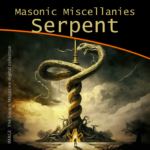 Masonic Miscellanies - The Symbol of the Serpent As a symbol, the serpent obtained a prominent place in all the ancient initiations and religions. |
 Masonic Miscellanies - The Four Veils in Royal Arch Masonry What are the four veils in Royal Arch Masonry? And what is the 'Ceremony of Passing the Veils'? Although common throughout Scotland, Ireland and the United States, it is mostly unknown in England, presently only worked in the Province of Bristol. ( and by dispensation ) |
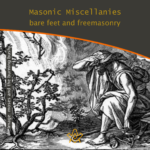 Masonic Miscellanies - Bare feet and Freemasonry A candidate for initiation into a Masonic Lodge often finds the requirements which he/she must fulfil somewhat odd. The mode of preparation often remains a puzzle, since the ritualistic explanation is not offered in full. Why are we 'slipshod' or "bare-footed" in Masonic Ritual? |
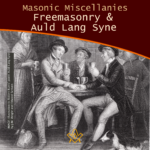 Masonic Miscellanies – Freemasonry and Auld Lang Syne Millions of people throughout the world will sing Auld Lang Syne to see out the Old Year. Few will know all the words, fewer still know what they mean, or that there is a link to Freemasonry. |
 Masonic Miscellanies - The Mosaic Pavement - why mosaic, why pavement? We are all familiar with the black and white chequered flooring of the Masonic lodge but where did it originate? There are a few theories… |
 Masonic Miscellanies – Masonic Master's Carpets Have you got a magic "Masonic Master's Carpet" in your lodge? I say 'magic' with my tongue firmly in my cheek because (as far as I know) these fabulous works of art don't bestow any mystical powers but can bestow some educational ones! However, considering their possible value today, they may magic up some interest (or funds). |
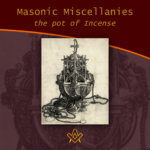 Masonic Miscellanies – The Pot of Incense Just when the pot of incense became an emblem of the third section of the Sublime Degree can not be stated with certainty. It is, apparently, an American invention or addition. But what does it symbolise? |
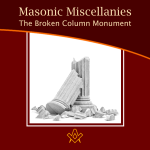 Masonic Miscellanies - The Broken Column Monument The story of the broken column was first illustrated by Amos Doolittle in the "True Masonic Chart" by Jeremy Cross, published in 1819. |
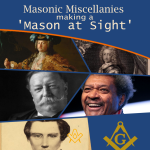 Masonic Miscellanies - Making a 'Mason at Sight' What does it mean to make a 'Mason at sight', and who was made one? |
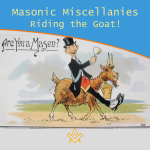 Masonic Miscellanies - Riding the Goat! Many Freemasons will have come across the phrase 'riding the goat', and will no doubt have been the butt of a joke about it (sorry, I couldn't resist!) But what does it mean and where did the phrase come from? |
 Masonic Miscellanies - What are the 'three dots'? Three dots or points in an upright triangular shape ∴ is most commonly known as the 'therefore' sign – so why is it used in Freemasonry? |
 Masonic Miscellanies - Keep Within Compass This month we discover a series of allegorical prints warning us to "Keep within Compass and you shall be sure, to avoid many troubles which others endure." |
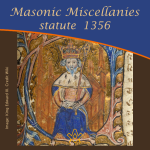 Masonic Miscellanies - statute 1356 Further to the reference in the article – The Builders - 6 - Free-Masons 'a statute was enacted against the Free-masons in 1356' – Regulations for masons who are hewers, on the one hand, and the light masons and setters on the other. |
 Masonic Miscellanies - An Anti-Masonic 'Apron'? The Anti-Masonic 'Apron' was created during the 1832 Presidential election in USA. It was not Ani-masonic. And it was not an apron. Read on to find out what and why it was created. |
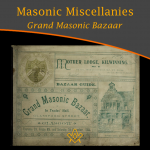 Masonic Miscellanies - Grand Masonic Bazaar (1895) Grand Masonic Bazaar (1895); to raise funds to clear the debt incurred by “Mother Kilwinning” in rebuilding their Lodge. |
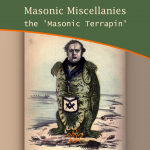 Masonic Miscellanies - the 'Masonic Terrapin' A satirical book from 1851 includes a bizarre caricature of a 'Masonic Terrapin' - all I can say is 'read on'… |
 Masonic Miscellanies - Masonic Bookplates You probably know what a bookplate is for, but did you know that the earliest known book mark/label dates from the reign of Amenhotep III in Egypt around 1391−1353 BCE?! |
 Masonic Miscellanies - Freemasonry & Bees Freemasonry & Bees - what's the buzz? The bee was among the Egyptians the symbol of an obedient people, because, says Horapollo, of all insects, the bee alone had a king. |
 Masonic Miscellanies - The mystery of the Tattooed Freemason In 1894, the body of a drowned man was found in the Bay of San Francisco - what they discovered was amazing. |
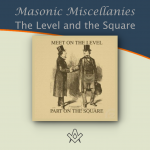 Masonic Miscellanies - The Level and the Square (A Poem) The Level and the Square (A Poem) - "We meet upon the Level, and we part upon the Square – |
 Masonic Miscellanies - The Mystic Tie What is the 'Mystic Tie'? Clue: it's not an item of neckwear! |
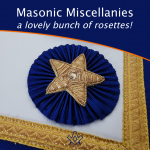 Masonic Miscellanies - A lovely bunch of rosettes! Where did the origin of the use of rosettes on Masonic aprons come from ? |
 Masonic Miscellanies - The Lodge of Sorrow The Lodge of Sorrow - Extracted General Ahiman Rezon, by Daniel Sickles, [1868] |
 Masonic Miscellanies - Memento Mori Memento Mori - a Masonic reminder to make your mark on the world |
 Masonic Miscellanies - A closer look at the Level and the Plumb-rule A closer look at the Level and the Plumb-rule |
 Masonic Miscellanies - The Symbolism of the Gloves The Symbolism of the Gloves and why Freemasons wear white gloves |
 Masonic Miscellanies - Will the real James Anderson please stand up? Will the real James Anderson please stand up? |
 Masonic Miscellanies - The Legend of the Third Degree The most important and significant of the legendary symbols of Freemasonry is, undoubtedly, that which relates to the fate of Hiram Abif. |
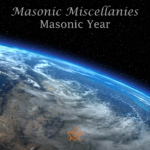 Masonic Miscellanies - Masonic Calendar Why do Freemasons use different 'years' to our regular calendar? |
 Masonic Miscellanies - What is a 'Lewis'? The English word 'Lewis' is a term belonging to operative Masonry, and signifies an iron cramp, which is inserted in a cavity prepared for the purpose in a large stone. |
 Masonic Miscellanies - From J.S.M. Ward Ever wondered why masons had to be 'free' or why we have a Tyler? |
masonic knowledge
to be a better citizen of the world
share the square with two brothers

click image to open email app on mobile device



